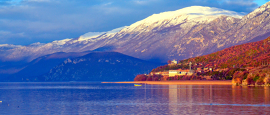Albania History, Language and Culture
History of Albania
Albania's history stretches back thousands of years, beginning with the Illyrians, an ancient people who inhabited the region. Under Greek and Roman influence, Albania became part of the Roman and later Byzantine Empires. Cities like Butrint thrived during these times, leaving behind impressive ruins that hint at a vibrant ancient culture.
Following the fall of the Western Roman Empire, Albania remained under Byzantine rule, blending Eastern Orthodox traditions with its Illyrian heritage. This era saw the construction of early Christian churches and fortresses, some of which still dot the landscape.
In the late 15th century, Albania fell under Ottoman control, an influence that shaped its culture, religion, and architecture for over four centuries. Skanderbeg, Albania's national hero, famously resisted Ottoman forces for decades. During WWII, Albania was occupied by Italian and German forces, but a strong partisan movement ultimately helped liberate the country in 1944.
Post-WWII, Albania entered a dark period under Enver Hoxha's communist regime, which isolated the country from the world. Marked by widespread oppression, economic stagnation, and a network of bunkers symbolising paranoia, the communist years left a lasting impact on the nation.
Since the fall of communism in 1991, Albania has transformed into a democratic republic, embracing tourism, trade, and infrastructure development. As it strengthens ties with Europe, the country continues to balance modern progress with its rich cultural heritage, offering visitors a glimpse into a nation on a dynamic path of transformation.
Did you know?
• Following the Italian invasion of Albania in 1939, King Zog fled the country and settled his bill at London's Ritz Hotel using gold bullion.
• In 1967, Albania declared itself the world's first atheist state, banning all religious practices. However, after the fall of communism in 1991, the country restored religious freedom.
• During the communist era, British comedian Sir Norman Wisdom's films were among the few Western movies allowed in Albania, leading to his status as a cult figure in the country.
Language in Albania
The official language of Albania is Albanian, which is spoken by the vast majority of the population. Albanian also has two main dialects: Gheg, spoken in the north, and Tosk, spoken in the south (Tosk is also the basis for the standard written language).
Other languages, such as Italian and Greek, are also spoken due to Albania's historical and cultural ties with these neighbouring countries.
English is becoming common, particularly among younger generations, in urban areas, and within the tourism sector.
Hello: Përshëndetje (pehr-shen-DEH-tyeh)
Good morning: Mirëmëngjes (meer-mehn-JESS)
Goodbye: Mirupafshim (meer-oo-PAHF-sheem)
Please: Ju lutem (yoo LOO-tehm)
Thank you: Faleminderit (fah-leh-meen-DEH-reet)
Yes/ No: Po (poh)/ Jo (yoh)
Excuse me/Sorry: Më falni (muh FAHL-nee)
How much does this cost?: Sa kushton? (sah koosh-TON?)
Where is the toilet?: Ku është tualeti? (koo usht TOO-ah-LEH-tee?)
Help!: Ndihmë! (NDEEH-muh!)




 You know where
You know where